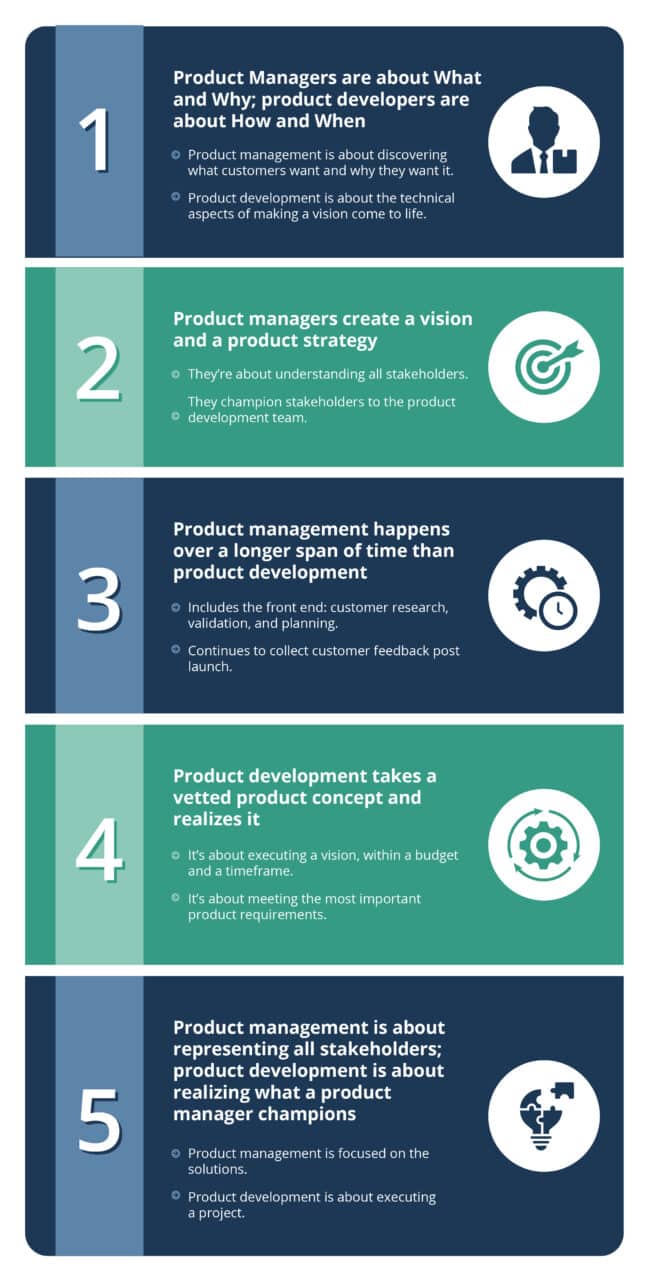Product management is about “what” and “why.” Product development is about “how” and “when.”
Product management is about creating a product vision. It’s about understanding customers and other stakeholders. And it’s about translating data into a set of prioritized features that a product development team can execute.
Product development is about taking a product concept and launching it into the marketplace. It takes the product manager’s vision and prioritization, and realizes a concept as a functional product design. It’s about execution.
Characteristics of product managers and product developers
Compared to product development, the product management team is
- More externally focused (customers, user experience, other stakeholders)
- More business focused (creating business case, commercialization)
- More customer focused (pain points, demos, observing, questioning)
Product managers do most of the decision-making when it comes to creating great products. Their work precedes product development.
Compared to product management, the product development team is
- More internally focused (budgets, staffing, process)
- More execution focused (schedules, sprints, project management)
- More technical tradeoff focused (prioritizing features, detailed UX design, iterating)
Product development, properly understood, takes on the product manager’s vision, which becomes a project or initiative that enters an ordered process and that the development or engineering team executes.

What do product managers do?
Product managers create a product vision and a pathway to realize it. They bridge a product development team with the customers, users, and other stakeholders. The product manager’s role is to define what the product development team will create and why they’re creating it.
Product managers capture user needs. They conduct user and market research and craft a marketing strategy. They analyze the competition, prioritize product features, and engage in ideation to conceive new product ideas that are aligned with strategy. They work with the engineering or software development teams to create prototypes, often through several iterations.
Product managers are also responsible for a go-to-market plan that creates a smooth product marketing launch. This may include pricing and messaging and many details related to marketing and sales.
The product manager’s role begins at the product’s initial conception, and continues throughout the product development process. The product manager usually owns the product roadmap that shows where products fit into an overall product strategy. It’s over only at the very end of the product’s lifecycle when it is retired from the marketplace.
The product management process is not over after the product launch. Product managers continue to receive customer feedback and track metrics that help improve both new and existing products.
At each step in the product lifecycle, product managers represent all stakeholders, internal and external.
What do product developers do?
Product developers usually follow an ordered process to realize a product vision. In hardware and mixed systems, product development is often the work of a cross-functional team, drawing on many skillsets from engineering and marketing, to finance and purchasing .
In software engineering using agile methodology, teams have a product backlog with prioritized tasks that manage the workflow. They usually work in sprints, a period of approximately two weeks where the dev team works to realize a demonstrable result. Product Managers wear their Product Owner hats when working with agile Teams to ensure the requirements (user stories are prioritized)
A traditional product development process consists of phases with gates, or reviews, separating these stages. These stages might include:
- Product definition optimization
- Prototyping
- Detailed design
- Validation/Testing
- Commercialization
TCGen offers a simplified process consisting of a discovery phase, that product managers lead, followed by:
- Definition
- Design
- Development
Together, these three phases are the product development process, properly understood. They are about a creative process where developers ask themselves how they will create a successful product and when it will be ready to launch. Product developers are about designing features, and ensuring the basic functionality of the new product. They’re about drawings, prototypes, coding, and tests. They’re about schedules, budgets and teams that are responsible for executing a product vision.
Product developers work best when they are empowered to create in relative freedom. We advocate a process where teams and management define the parameters of a new product development project early in the process.
The team is then left alone to execute the project, assuming that it will follow the parameters. If the team runs into trouble, you need a clear and swift escalation process to put the team back on track.

Product Management vs Product Development: TLDR
- Product Managers are about What and Why; product developers are about How and When.
- Product managers create a vision for a product and a product strategy to realize the vision. They are about user and market research and understanding customer needs. They then champion all stakeholders to the product development team.
- Product management happens over a longer span of time than product development. It includes the front end, through customer research, and validation and planning, until the product is created and launched. They continue to collect customer views and feedback that they incorporate into new and existing products post launch.
- Product development is the portion of this cycle that takes a vetted product concept and realizes it. It’s about executing a vision, within a budget and a timeframe, while meeting the most important product requirements.
Product management is about representing all stakeholders as a product comes to life; product development is about taking what a product manager champions, and executing it as a project.
